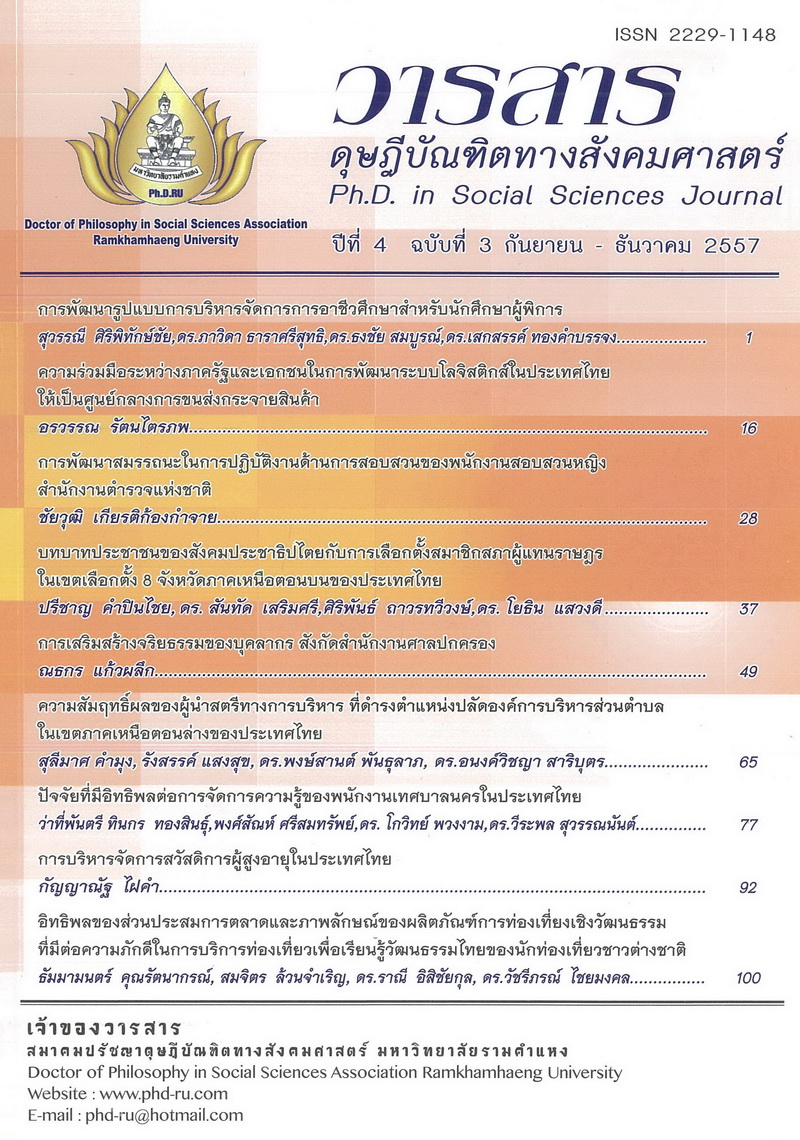การพัฒนารูปแบบการบริหารจัดการการอาชีวศึกษาสำหรับนักศึกษาผู้พิการ
Main Article Content
Abstract
ส่วนที่ 1) ความนำ กล่าวถึง แนวคิดในการพัฒนารูปแบบการบริหารจัดการการอาชีวศึกษา สำหรับนักศึกษาผู้พิการ หลักการ เป้าหมาย และมิติองค์ประกอบตัวแปรย่อยด้านการบริหารจัดการการ อาชีวศึกษาสำหรับนักศึกษาผู้พิการ ส่วนที่ 2) ตัวแปรองค์ประกอบของนักศึกษาผู้พิการ ประกอบด้วย คุณลักษณะที่พึงประสงค์ของนักศึกษาผู้พิการด้านพฤติกรรมทางการศึกษาและด้านการจัดการศึกษา ส่วนที่ 3) ตัวแปรองค์ประกอบของการจัดการศึกษา ประกอบด้วย ตัวแปรย่อยด้านการบริหารงานวิชาการ ด้านเทคโนโลยีสิ่งอำนวยความสะดวก และด้านการประสานงาน ซึ่งได้มาปรับประยุกต์ใช้ในการบริหาร งานแบบการเรียนร่วม กำหนดขอบข่ายภาระงาน ส่วนที่ 4 ตัวแปรองค์ประกอบของการส่งเสริมสนับสนุน ประกอบด้วย ตัวแปรย่อยด้านการส่งเสริมสนับสนุนของภาครัฐ ด้านการส่งเสริมสนับสนุนของชุมชน ด้าน การส่งเสริมสนับสนุนของภาคเอกชน ด้านการส่งเสริมสนับสนุนของภาคเอกชนที่ไม่หวังกำไร ด้าน การส่งเสริมสนับสนุนของสื่อสารมวลชน ด้านการส่งเสริมสนับสนุนของผู้ปกครอง และด้านการส่งเสริม สนับสนุนของกลุ่มเพื่อนนักเรียน ส่วนที่ 5) การนำรูปแบบการบริหารจัดการการอาชีวศึกษาไปสู่การปฏิบัติ ประกอบด้วย 4 ขั้นตอนได้แก่ การเตรียมความพร้อม การจัดการเรียนการสอน การฝึกประสบการณ์ และ การติดตามประเมินผล
The Developing Model of Vocational Education Management for Disabled Students
In this dissertation, the researcher examines the conditions of vocational education management for disabled students. The researcher also develops a vocational education management model for disabled students. Findings are as follows: 1) The opinions concerning the conditions of vocational education management for disabled students were expressed at a moderate level in all aspects. 2) The development of a vocational education management model for disabled students contained five parts as follows: Part 1) The Introduction pertained to concepts used in the development of the vocational education management model for disabled students, principle, goals, and the dimensions of sub-variable components in the aspect of vocational education management for disabled students. Part 2) Variables governing behavioral components of the disabled students under consideration consisted of desirable characteristics of disabled students in the aspects of educational behavior and educational organization. Part 3) Variables governing components of educational organizations consisted of sub-variables in the aspects of academic management, facility technology, and coordination. These variables could be applied to the management of co-education Part 4) Variables governing the components of promotion and support. This consisted of sub-variables in the aspects of promotion and support from the public sector; communities; the private sector; the non-profit private sector; personal media; parents; and fellow students. Part 5) The implementation of a vocational education management model. This consisted of preparation; instruction and study; gaining experience and training; and follow-ups and evaluations.
Article Details
Academic articles, research articles, and book reviews in the Ph.D. in Social Sciences Journal are author’s opinions, and not the publisher’s, and is not the responsibility of the Ph.D. in Social Sciences Journal Philosophy Association, Ramkhamhaeng University. (In the case that research is done on human, the researcher has to be trained in Ethics for Doing Research on Human Training and has to produce the evidence of the training).


